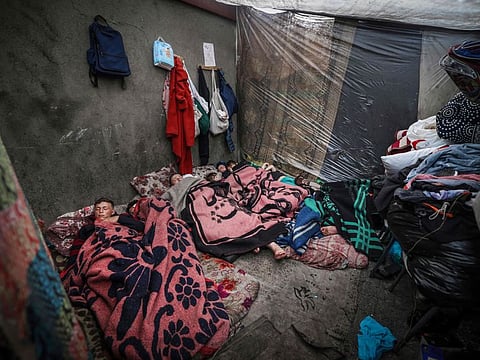‘Mother, let me sleep in your arms, I don’t want to die’: Nights bring fresh horrors in war-torn Gaza
‘We want her to feel safe, but I don’t even have a cradle... for her to feel comfortable’

GAZA STRIP: As the sun sets over Gaza, displaced Palestinians in plastic tents are plunged into darkness, tormented by the buzzing of Israeli drones, constant artillery fire and fear they may not survive the night.
“Mother, let me sleep in your arms, I don’t want to die,” said six-year-old Yasmine, clinging to her mother in their small, make-shift shelter.
“My children are afraid to sleep,” said Safa Abu Yasin. “I’m afraid for their lives too.”
Abu Yasin and her four daughters are in Al Mawasi, an area Israeli forces have said is a humanitarian zone.
Despite repeatedly shrinking this designated safe area, more and more displaced Palestinians continue to cram into it, seeking refuge that has become increasingly elusive.
The majority of Gaza’s 2.4 million people have fled their homes at least once during the war, now in its 11th month.
Abu Yasin is often wide awake throughout the night, trying to soothe her baby girl Loujain, born in April, who repeatedly wakes up crying.
“It is very difficult to calm her,” said Abu Yasin.
“We want her to feel safe, but I don’t even have a cradle... for her to feel comfortable.”
“Come to sleep, come to sleep,” she softly sings an old Levantine lullaby that tells children that a bird will come to watch over them as they sleep.
Her other daughters complain about the thin mattress they all share on the floor, often waking up when they bump into each other.
Sleeping in the rubble
“I miss my pillow,” said Farah Sharshara, 32, from her tent in the central area of Deir Al Balah, once a thriving district but now reduced to rubble by Israeli bombardment.
She rarely takes a shower due to the lack of water, while privacy in the tents is simply nonexistent.
“You always have to adapt to other people’s ways,” she said.
“There are those who snore, those who wake up screaming, crying in fear, and then there are the insomniacs who just chat and disturb everyone,” Sharshara said.
One displaced man, Rami, describes his six-by-four-metre tent in which 27 members of his extended family sleep.
“Before the war each of us had our own room” in their respective homes, he said, giving only his first name.
“Now we all sleep on a plastic mat, a blanket and a foam mattress,” said Rami, who has been displaced several times during the war.
In a territory where the United Nations estimated in May that over 55 per cent of buildings had been completely or partially destroyed, tents — some provided by international organisations, others purchased at high prices — have become the most common form of shelter for the displaced.
Just days after the war broke out on October 7, several aid groups distributed sleeping kits containing essential materials for resting at night.
But now they say much-needed materials for repairs and shelter construction are not being allowed in by Israeli authorities, who control all points of access to the besieged territory.
Without other options, more and more Gazans now sleep in the rubble of destroyed buildings, or on the streets, where flies and insects swarm amid stinking sewage.
Palestinians can often be seen rummaging through the debris, while there are reports of many breaking into empty homes to get their hands on whatever furniture they can to use as firewood for cooking.
Psychological threat
“People frequently lack the basic necessities for quality sleep: privacy, temperature control, darkness, and quiet,” Eman Alakhras, a psychologist for the Doctors of the World aid group, told AFP.
Many, especially the sick, request sleeping pills, she said.
“There are those who cannot sleep in order not to die, as many have died in front of their eyes and they feel that they must stay awake so that they can escape in case of danger.”
Prolonged sleep deprivation increases the risk of post-traumatic stress syndrome, cognitive disorders, and developmental delays in children, she added.
The war in Gaza broke out after Hamas attacked Israel on October 7, which resulted in the deaths of 1,198 people, mostly civilians, according to an AFP tally based on official Israeli figures.
Vowing to destroy Hamas, Israel’s retaliatory military offensive has so far killed at least 40,139 people in Gaza, according to the health ministry of the Hamas-run territory, which does not provide details of civilian and militant deaths.
“Nothing is the same as before,” said Mohammed Abdel Majid, who was displaced along with his family of 30.
Before the war, the family had a roof over their heads.
“Today, all we have is a tent, be it the freezing winter or under the scorching sun in the summer.”
Sign up for the Daily Briefing
Get the latest news and updates straight to your inbox


